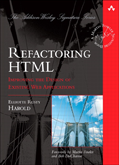Code Coverage Has a Blind Spot
Sunday, December 31st, 2023Here’s the coverage report on a recent PR of mine:
All modified and coverable lines are covered by tests ?
Comparison is base (a765aef) 85.95% compared to head (fe02e1b) 85.95%.
Additional details and impacted files
@@ Coverage Diff @@
## master #546 +/- ##
=========================================
Coverage 85.95% 85.95%
Complexity 3480 3480
=========================================
Files 230 230
Lines 8225 8225
Branches 960 960
=========================================
Hits 7070 7070
Misses 865 865
Partials 290 290
Precisely identical. What happened? Did I change a comment? Well, no. In fact I added tests for
situations that were not currently covered, so why didn’t coverage increase?
(more…)
